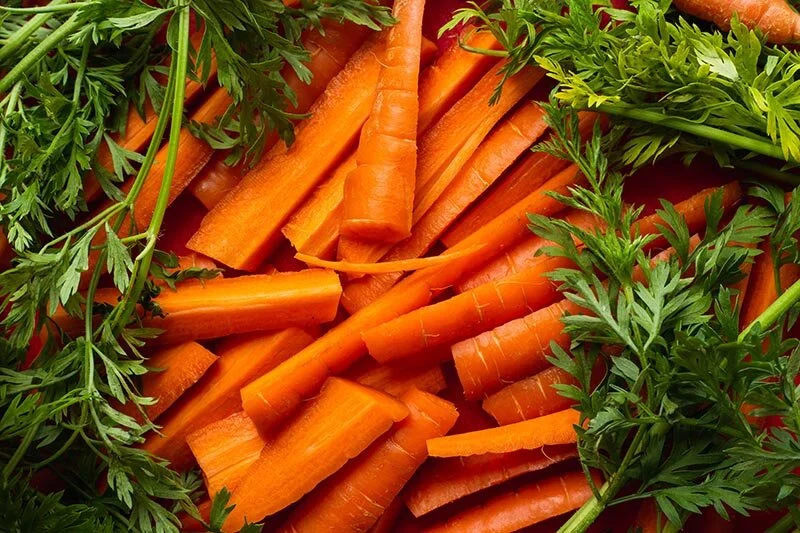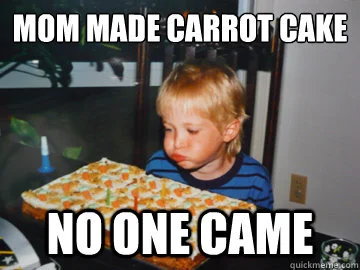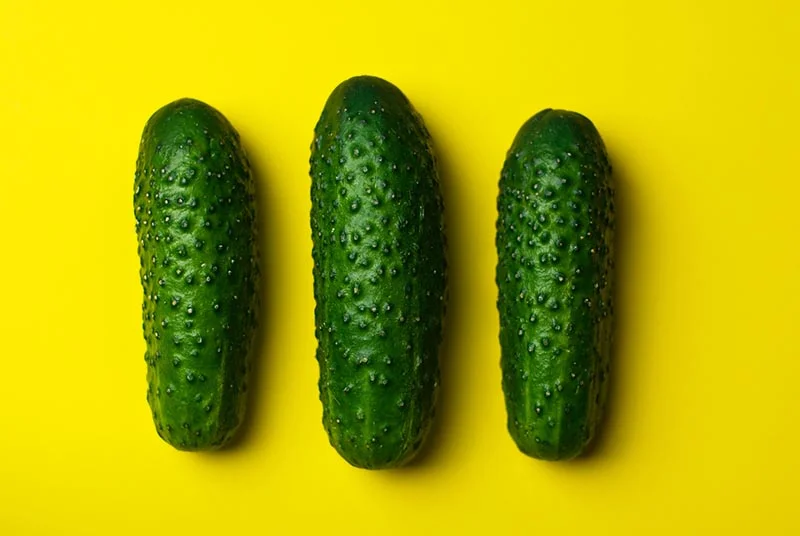The Carrot Haters Among Us
They’re still the #4 veggie in the U.S., but they used to be more popular.
By Jessie Schiewe
If you’re reading this article, we’re going to take a wild guess and say you clicked on it because you don’t like carrots.
Well, good news: You’re not alone. There are other people who hate carrots out there in the world, too.
Not that we’re easy to find. We tend to stay mum about our repulsion for the root vegetable, partly to avoid sounding impolite and also because it’s unwise to let your enemies know your weaknesses.
When a handful of carrot shreds are thrown into our salads, you won’t hear us complain. When someone offers us a slice of carrot cake, we’ll graciously take one — and then surreptitiously chuck it later.
For so-called Carrot Haters, lying, as well as denial, are second-nature to us — vital survival tactics that have enabled our kind to stay undetected amongst the general carrot-loving population for decades, if not centuries.
As children, we lied to our parents, stabbing at the slices of mushy, steamed orange chunks on our plates with gusto, our actions stemming from a desire to please the people who gave us life, or maybe just to qualify for that after-dinner ice cream.
In adulthood, we’ve continued the lying, too. We’ll refrain from telling waiters to hold the carrots in our pasta primavera because we want to seem evolved and worldly.
And as parents, we’ll gobble them up cold and raw in front of our children, trying to fool our ilk into falling in love with the very vegetable that we’ve long been at war with.
Credit: Chris Feser / Flickr
Carrot Haters share other commonalities, too.
Many of us are millennials, or even younger than that. We’re more likely to be of an ethnic background that’s not white or Asian, the two communities that consume carrots the most.
Carrot Haters also tend to live on the West Coast or in the South, and, according to the government, are less likely to live in “upper income households.”
And for now, we Carrot Haters seem to be winning. Thanks to our collective abstinence, carrot consumption has dropped considerably in the last 20 or so years. In 1997, the average American ate 14.1 pounds of carrots per year, according to data from the U.S. Department of Agriculture. By 2015, that number had dropped off to approximately 8.3 pounds per person.
Millennials, or people between the ages of 18 and 39, are making the most headway in dismantling the reign of carrots.
According to The Packer, a produce industry news site, only 49% of people in that age group bought carrots in 2018, compared to more than 70% in the three other age groups.
That’s pretty good progress considering how jaw-droppingly popular carrots were at the tail-end of the 20th century.
Beginning in the mid-1980s and continuing through the 1990s, carrots experienced a heyday thanks to a farmer named Mike Yurosek in Bakersfield, California. Lauded as the “inventor” of baby carrots, Yurosek came up with the idea of shaving, cutting, and shaping larger carrots considered too “ugly” to sell at grocery stores into adorable, perfectly formed ones.
Not only did this help cut back on waste, but it introduced a whole new product onto the market, one that quickly caught on with consumers. Across generations, people went gaga for the miniature vegetables, with nationwide carrot consumption jumping more than 30% in 1987.
Credit: Kelly / Flickr
Carrots are thought to have derived from central or western Asia (likely Afghanistan) and were introduced to the United States by the first wave of colonists in Virginia, who used them largely for medicinal purposes. Nowadays, the vast majority of carrots are grown in one of three countries: China, followed by Russia, and then the U.S., with production highest in California.
The vegetable’s versatility — you can eat them raw, cooked, steamed, juiced, baked, dried — is to thank for its continued popularity. Since 2015 and continuing through 2019, carrots were the fourth most consumed fresh vegetable in the U.S., following potatoes, tomatoes, and onions, respectively.
Clearly the number of people who like carrots still vastly outweighs those of us who’d rather see them obliterated through a mass famine.
But the tides seem to be turning.
Green, you might say, is the new orange, with vegetables like kale, spinach, arugula, and avocado outshining the orange vegetable on menus and grocery store shelves.
Memes that mock carrots proliferate online and someone even created a Facebook page for us.
Because of this, Carrot Haters are increasingly coming out of the fold and going public with their revulsions.
“Carrots are gross!” someone who hates them wrote on Reddit in April 2019.
“Baby carrots make my lips itchy, and cooked carrots are somehow both slimy and crunchy without fully being crunchy.”
As for why some of us hate carrots, it could have something to do with how we were raised. Maybe, for many Carrot Haters, we weren’t introduced to the vegetable until it was too late. Perhaps we’d already had too many pudding cups and ice cream bars before having our first bite of the carrot baby food, and by then, our taste buds were already too jaded to find anything to like in it.
Research shows that if you start eating a particular food at a young age, you’re more inclined to like it later in life. Your taste preferences can even be influenced before birth.
In one study from the early 2000s, children whose mothers drank carrot juice during their third trimester were more likely to prefer carrot-flavored cereal than those kids whose mothers did not drink the orange stuff. The same phenomenon was observed with children whose mothers drank carrot juice while breastfeeding them.
Those of us who weren’t exposed to the tubular vegetable while still in the womb or before we knew our ABC’s have an uphill battle to climb if ever we want to overcome our carrot repulsions. At this point in our lives, we’ve likely tried too many other better-tasting foods to want to integrate the lowly carrot into our diets.
Those of us who hate carrots might also have been scarred by the ways in which we’ve seen them prepared and eaten.
My mother — who recently confirmed that she didn’t consume them while I was in the womb — is a carrot fiend. Growing up, and still, to this day, I’ve had to witness her chomping on them in the most disgusting of concoctions.
From a young age I watched her squirt mustard on baby carrots and then roll them up inside slices of deli turkey. Now in her 60s, she’s particularly fond of eating chopped up carrots that have been doused in rice wine vinegar and parmesan cheese.
She calls them salads. I just try not to hurl.
For many Carrot Haters, it’s their taste that’s the hardest to get over. Unlike most other vegetables, carrots have a sweet flavor profile that can make them both surprising to the palette and incompatible with more savory ingredients found in the same meal.
“My issue with them is that I want them to be less sweet and more hearty,” lamented one Carrot Hater on Reddit.
Others just don’t like the flavor of carrots, period, saying they taste “soapy” and “dirty.”
Color also might have something to do with it. There aren’t that many naturally-occurring orange foods found in nature, making the appearance of a carrot on your dinner plate an aesthetically pleasing sight to behold, but not necessarily one that’s likely to whet your appetite. If you believe in color theory, orange is associated with brain stimulation and increased mental activity.
Though some color theorists believe this acuity can “stir up a sensation of hunger,” I’d counter it does the opposite for Carrot Haters, revving up all the many reasons why we loathe the long, wrinkly roots in the first place.
Humans aren’t the only beings that have tiffs with carrots. There are dogs and even natural herbivores, like guinea pigs, that won’t touch the vegetable.
And don’t misunderstand us. We Carrot Haters haven’t voluntarily chosen to detest them. It’s something innate and hardwired in us, something so deeply ingrained that it would take thousands of dollars worth of aversion therapy sessions and far too many nauseated trips to the bathroom to make it worth our while to overcome.
But don’t think we’re unaware of what we’re missing out on. Low calorie and nutrient-rich, carrots make for guilt-free snacks, convenient dipping utensils, and heart-friendly sweeteners in baked goods. They’re also jam-packed with vital ingredients like Vitamin A, Vitamin K, potassium, fiber, and beta carotene, and have been linked to lower cholesterol levels and improved eye health.
“[I] hate carrots, [but I] wish I loved them though bc [sic] they seem like a great snack that could replace chips and crackers,” bemoaned a Redditor who is not a carrot fan.
Credit: Stu Spivack/Flickr
You see, just because we hate carrots doesn’t mean we don’t want to be healthy, too. We do.
But thanks to the myriad other fruits and vegetables out there, as well as the miracle invention of vitamins and supplements, we don’t have to rely solely on the icky orange roots to get what we need.
We also won’t ever have to worry about accidentally eating too many of them and experiencing orange-hued skin as a result, which is a thing that actually happens.
The fortunate part of it all is that there are enough carrots in the world and people who like to eat them that we Carrot Haters don’t have to pick up the slack. In fact, we don’t mind if farmers keep growing them and if parents continue spooning them down their newborns’ throats.
Just remember that we’re out here, too, and know that the next time you cook something with carrots in it, not everyone’s going to be happy about it.


























